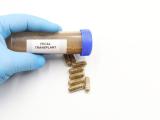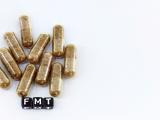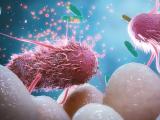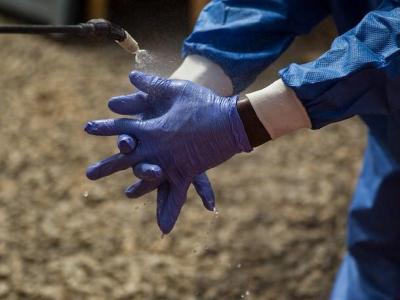Aug 9, 2012
Candidate vaccine protects monkeys from Nipah virus
A candidate vaccine proved to be effective in protecting green monkeys against the deadly Nipah virus, for which no current vaccine exists, according to a study yesterday in Science Translational Medicine. Nipah virus can kill more than 75% of people it infects and was the model for the pandemic pathogen featured in the recent movie Contagion. A team of US federal and university scientists immunized three groups of three African green monkeys with either 10, 50, or 100 micrograms of antigen in a subunit vaccine that contains a soluble portion of the G glycoprotein of the related Hendra virus. All doses included alum, an immune-boosting adjuvant, and a 10th monkey received only alum and served as a control. The animals received two doses 21 days apart, and were inoculated with Nipah virus 42 days after the first dose. All vaccinated monkeys survived their infection, while the control animal died. The highest dose
provided "near-sterilizing immunity to the host," the authors wrote, but immunity with the lower doses appeared to wane 28 days after virus challenge. "These findings are really quite promising and appear to offer a real potential treatment for either Nipah or Hendra virus infection in people," corresponding author Christopher C. Broder, PhD, professor of microbiology at Uniformed Services University of the Health Sciences in Bethesda, Md., said in a EurekAlert press release.
Aug 8 Sci Transl Med abstract
Aug 8 EurekAlert press release
Survey: Half of Americans support release of genetically modified mosquitoes
About half of US adults would support release of genetically modified mosquitoes to combat mosquitoes and the diseases they carry, but support ebbed to as low as one-third depending on how the information was presented, according to a new survey. Researchers from North Carolina State University (NC State) interviewed 1,211 people in July. Among respondents who were told that "sterile" mosquitoes had been bred to control mosquito populations, 42% supported their release while 14% disagreed, according to an NC State news release. After receiving more technical information about the idea, 51% agreed, even though they then knew the "sterile" mosquitoes were genetically engineered. When potential risks were outlined, however, support dropped to 33%. Approval was lower across the board when the mosquitoes were described as "genetically engineered," "genetically modified," or "transgenic" rather than simply
"sterile." The survey has a sampling error of plus or minus 2.8 percentage points.
Aug 8 NC State news release
Experimental disinfectant shown effective against spore-forming bacteria
A new disinfectant that works at extremely low concentrations could be used in healthcare settings to help control spore-forming bacteria, according to a study in the Journal of Medical Microbiology. Researchers from the Universite de Saint-Boniface in Winnipeg tested the compound, Akwaton, against Bacillus subtilis, whose spores attach to surfaces and are heat-tolerant and difficult to destroy. Akwaton destroyed B subtilis spores, both suspended in water and attached to stainless steel or glass surfaces, at concentrations well below 1% after just 90 seconds. It was equally effective at concentrations below 0.1% if left to act longer. Most chemical disinfectants control or prevent spore growth but don't destroy spores, according to a press release from the Society for General Microbiology (SGM), which publishes the journal. "Most disinfectants have to be applied at much higher
concentrations—typically between 4%-10%—to properly get rid of bacterial spores," said lead researcher Mathias Oule, PhD. "Akwaton is non-corrosive, non-irritable, odourless, and is effective at very low concentrations. All these properties make it an ideal disinfectant for hospitals and laboratories.," he added. The disinfectant, described as nontoxic to humans at low concentrations, may also be used to help control persistent hospital-acquired infections from such spore-forming bacteria as Clostridium difficile, according to the release.
Aug 7 J Med Microbiol abstract
Aug 7 SGM press release


















